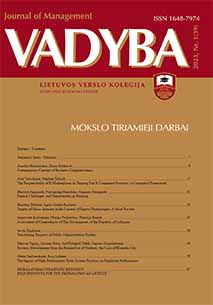FINTECH CHALLENGES AND OPPORTUNITIES IN BANKING
FINTECH CHALLENGES AND OPPORTUNITIES IN BANKING
Author(s): Bhavish Jugurnath, Prayagsing Hemshika, Samanta ŠtraupaitėSubject(s): Business Economy / Management, Financial Markets, Accounting - Business Administration, ICT Information and Communications Technologies, Socio-Economic Research
Published by: Lietuvos verslo kolegija
Keywords: Fintech; Digitalization; Consumer; Technology Acceptance Model (TAM); Statistical Package for the Social Sciences (SPSS); Multiple Regression;
Summary/Abstract: The potential and impact of fintech on banks is becoming an increasingly important topic. Electronic banking, mobile phone payments and other innovative financial services have become an integral part of every person's life. FinTech is a new, fast-growing part of the financial services industry, so they have limited understanding of emerging phenomena (Anagnostopoulos, 2018). Fintech analyses are important not only for understanding financial innovation, but also for all aspects of finance in terms of consumer adaptation using fintech (Chen, 2016). Investments in FinTech are reaching record highs, so it is often said that FinTech institutions can change the banking system and reduce its popularity. Authors Jünger and Mietzner (2019) analysed in their article on the digitization of banking transactions that consumers tend to choose FinTech companies more than banks when it comes to transparency policies. In this context, the preferences and perceptions of the Mauritian population are analysed when it comes to adoption, awareness, current and future use of fintech services, which defines the scientific novelty of this topic. Consumer adoption attitudes of fintech services in Mauritius were analysed using an Extended Technology Acceptance Model (TAM). A questionnaire was designed and sent to the population of Mauritius where 176 responses were obtained. The data was analysed using Statistical Package for the Social Sciences (SPSS) and a multiple regression was used to test the hypotheses and find out if the independent variables (subjective norms, perceived usefulness, perceived ease of use, trust and perceived risk) have a positive influence on the dependent variable (attitude) of users in the adoption of fintech services. Next, subjective norms, perceived usefulness, perceived ease of use, and trust were found to positively influence consumer attitudes when choosing fintech services, while perceived risk did not of positive influence on consumer attitudes when adopting fintech services, which provides more information to the literature on fintech services personalization using TAM. Limitations and recommendations are discussed below.
Journal: VADYBA
- Issue Year: 39/2023
- Issue No: 1
- Page Range: 31-38
- Page Count: 8
- Language: English

